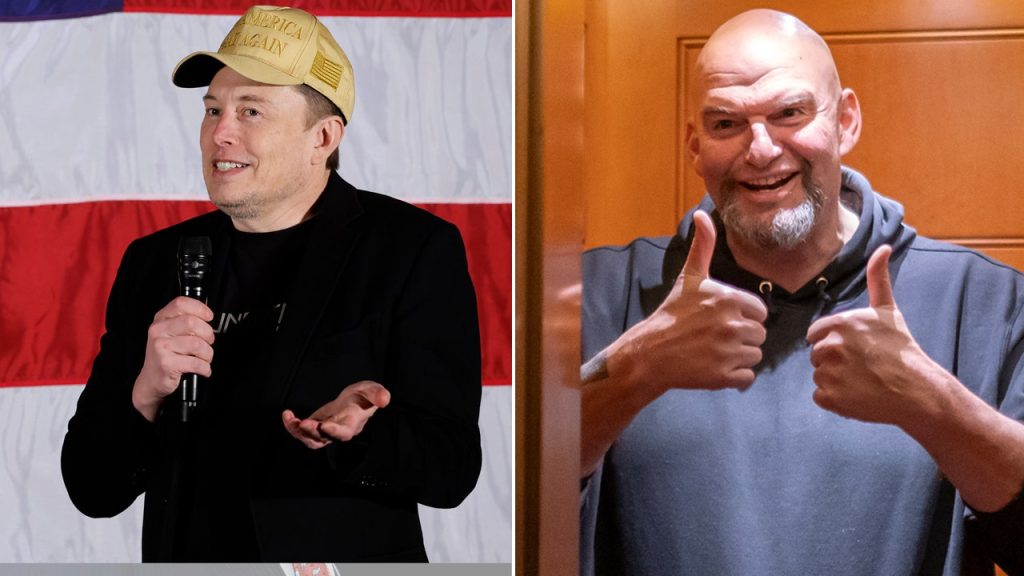Elon Musk’s recent commendation of Senator John Fetterman has sparked a discussion about bipartisanship and the role of business leaders in politics. Musk, known for his outspoken nature and ambitious ventures in technology and space exploration, praised Fetterman on social media platform X, formerly Twitter, stating that it’s “hard not to like” the Pennsylvania Democrat. Musk highlighted Fetterman’s apparent willingness to prioritize national interests over partisan politics, a quality increasingly rare in today’s polarized political landscape. This compliment comes on the heels of Fetterman’s own positive remarks about Musk, acknowledging his significant contributions to American society through companies like Tesla, SpaceX, and his involvement in the field of artificial intelligence. Fetterman emphasized that while they may belong to different political “teams,” it doesn’t necessitate an adversarial relationship.
Fetterman’s acknowledgment of Musk’s contributions to the American economy and nation underscores a pragmatic approach to evaluating individuals and their impact, irrespective of political affiliations. This sentiment resonates with a growing desire for greater cooperation and less division in addressing critical national issues. However, the exchange also drew criticism, particularly from Rep. Derrick Van Orden, R-Wisc., who questioned Fetterman’s sincerity, pointing to his voting record as evidence of partisan leanings. This highlights the inherent tension between acknowledging individual merit and scrutinizing political actions within the context of broader party agendas. It raises the question of whether bipartisanship can truly flourish in an environment where political actions are often viewed through a partisan lens.
Adding another layer to this complex interplay of business and politics is Musk’s involvement with the Department of Government Efficiency (DOGE), a newly formed initiative under President-elect Donald Trump. Musk, alongside former GOP presidential candidate Vivek Ramaswamy, has been tasked with streamlining government spending and addressing the growing national debt. This partnership between a prominent business figure with unconventional political leanings and a self-proclaimed “small-government crusader” further blurs the lines between traditional political affiliations and pragmatic problem-solving. Their commitment to serving as outside volunteers, rather than federal employees, underscores an intention to approach government reform from an external perspective, potentially free from the constraints of bureaucratic inertia.
The DOGE initiative, with its focus on fiscal responsibility and government efficiency, has garnered attention from both sides of the aisle. Senator John Thune, R-S.D., expressed optimism about working with Musk and Ramaswamy to address the national debt crisis, signaling a potential for bipartisan cooperation on this critical issue. Musk and Ramaswamy’s approach, as outlined in a Wall Street Journal opinion piece, emphasizes a hands-on approach to cost-cutting, moving beyond the traditional limitations of government commissions and advisory committees. This pragmatic focus on actionable solutions, rather than simply producing reports, resonates with a public increasingly frustrated with government inefficiency.
The convergence of Musk’s praise for Fetterman, Fetterman’s reciprocal acknowledgement of Musk’s contributions, and their shared focus on addressing national challenges, albeit through different avenues, paints a complex picture of the evolving relationship between business, politics, and public service. This dynamic underscores a growing recognition that tackling complex issues may require unconventional alliances and a willingness to transcend traditional partisan divides. Whether this nascent collaboration between figures from different political and professional backgrounds can yield meaningful results remains to be seen. However, it signals a potential shift towards a more pragmatic and solution-oriented approach to governance.
The skepticism expressed by Rep. Van Orden serves as a reminder of the deep-seated partisan divisions that persist in American politics. While gestures of bipartisanship and collaboration are often lauded, translating them into concrete policy changes requires navigating a complex web of political interests and ideological differences. The success of the DOGE initiative, and any other bipartisan efforts, will depend on the ability of its proponents to bridge these divides and build consensus around common goals. The ongoing dialogue surrounding Musk, Fetterman, and the DOGE initiative reflects a broader conversation about the role of business leaders in shaping public policy and the potential for cross-partisan collaboration in addressing critical national challenges.

